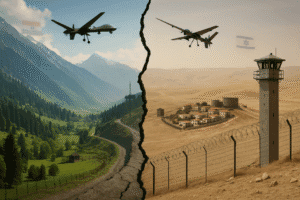India’s Expansionist Tactics: 5 Shocking Parallels to Israel That Threaten South Asia’s Stability
India’s May 2025 air strikes on Pakistan-administered Kashmir, framed as retaliation for a terrorist attack, signal a dangerous pivot toward militarized Hindu nationalism. Mirroring Israel’s playbook in Palestine, the strikes targeted civilian areas under opaque pretexts, killing dozens and exacerbating regional tensions. Prime Minister Modi’s government, leveraging ethno-religious rhetoric, has increasingly adopted expansionist policies—demographic shifts in Kashmir, anti-Muslim laws, and state-backed vigilantism—to entrench a Hindu-majority state.
Civilian casualties, mass detentions, and extrajudicial tactics underscore the human cost of this ideological agenda. Global powers, prioritizing strategic alliances over accountability, risk normalizing violations of international law. Meanwhile, Pakistan’s retaliatory strikes and India’s use of Israeli drones deepen instability between nuclear rivals. The crisis exposes the erosion of diplomatic norms and the urgent need for transparent investigations, de-escalation, and a reckoning with Hindu nationalist militarism. Without intervention, South Asia risks spiraling into perpetual conflict, sacrificing civilian lives to ideological and territorial ambitions.

India’s Expansionist Tactics: 5 Shocking Parallels to Israel That Threaten South Asia’s Stability
The recent escalation between India and Pakistan in May 2025 has reignited global concerns over regional stability and the erosion of international norms. India’s unilateral air strikes on Pakistan-administered Kashmir and civilian areas, framed as retaliation for a terrorist attack in Pahalgam, reflect a troubling shift toward militaristic strategies reminiscent of Israel’s approach in Palestine. This incident underscores the growing influence of Hindu nationalist ideology on India’s foreign policy and its implications for South Asian geopolitics.
Contextualizing the Crisis
The May 2025 strikes followed an attack on Indian tourists in Pahalgam, Kashmir, which Delhi attributed to Pakistani-backed militants. While Pakistan denied involvement and called for an international investigation, India bypassed diplomatic channels, opting instead for a military response labeled “Operation Sindoor.” The operation’s name, evoking Hindu matrimonial symbolism, hints at deeper ideological motivations tied to Prime Minister Narendra Modi’s vision of a Hindu Rashtra (Hindu nation). Critics argue the government exploited the tragedy to justify aggressive posturing, echoing Israel’s narrative of existential threats to legitimize disproportionate force.
Parallels with Israel’s Playbook
India’s actions mirror tactics employed by Israel in Palestine, particularly in three areas:
- Securitization and Collective Punishment: By targeting mosques, residential areas, and infrastructure, India adopted Israel’s strategy of framing civilian spaces as militant hubs, thereby justifying collective punishment. The lack of transparency regarding evidence—akin to Israel’s opaque claims during Gaza operations—raises questions about accountability.
- Settler Colonialism and Demographic Shifts: Since revoking Kashmir’s autonomy in 2019, India has accelerated efforts to alter the region’s demographics through residency permits for non-Kashmiris and Hindu-only settlements. This parallels Israeli settlements in the West Bank, which seek to entrench territorial control.
- Techno-Military Collaboration: India’s use of Israeli-made drones and surveillance systems highlights deepening bilateral ties. Both nations share expertise in ethno-nationalist governance, from bulldozer demolitions targeting minorities to AI-driven policing in contested regions.
The Rise of Hindu Nationalism
Modi’s Bharatiya Janata Party (BJP) has institutionalized Hindutva, an ideology envisioning India as a homeland for Hindus. Policies like the Citizenship Amendment Act (CAA), which fast-tracks citizenship for non-Muslim migrants, mirror Israel’s Law of Return. Such measures marginalize Muslims, India’s largest minority, while emboldening vigilante violence and state-sanctioned displacement.
In Kashmir, the BJP’s crackdown—mass detentions, media blackouts, and extrajudicial killings—reflects a broader agenda to suppress dissent. The demolition of homes under counterterrorism pretexts, a tactic borrowed from Israel’s playbook, further destabilizes the region.
Global Complicity and Regional Fallout
The muted international response to India’s strikes reveals a geopolitical calculus prioritizing economic and strategic interests over human rights. Western nations, eager to counterbalance China, have overlooked India’s democratic backsliding. Meanwhile, Pakistan’s retaliatory measures risk perpetuating a cycle of violence between nuclear-armed rivals.
Civilian casualties on both sides underscore the human cost of escalation. In Kashmir, already a flashpoint for decades, the strikes exacerbate trauma among communities subjected to militarization since partition in 1947.
Pathways to De-escalation
To avert further crisis, the international community must:
- Demand Transparency: Independent investigations into the Pahalgam attack and subsequent strikes are critical to verifying claims and preventing misinformation.
- Reinforce Diplomatic Channels: Mediation by neutral parties, such as the UN or ASEAN, could revive dialogue sidelined by militarism.
- Address Root Causes: Sustainable peace requires tackling Kashmir’s political status, cross-border terrorism, and the ideological drivers of Hindu nationalism.
Conclusion: A Call for Restraint
India’s embrace of expansionist tactics threatens not only regional stability but also the rules-based international order. While combating terrorism is legitimate, conflating security operations with ethno-nationalist agendas risks normalizing violence against civilians. The world must heed Kashmir’s plight as a warning: without urgent course correction, South Asia risks becoming another theater for endless conflict, where might eclipses right, and human lives are collateral in ideological battles.
You must be logged in to post a comment.